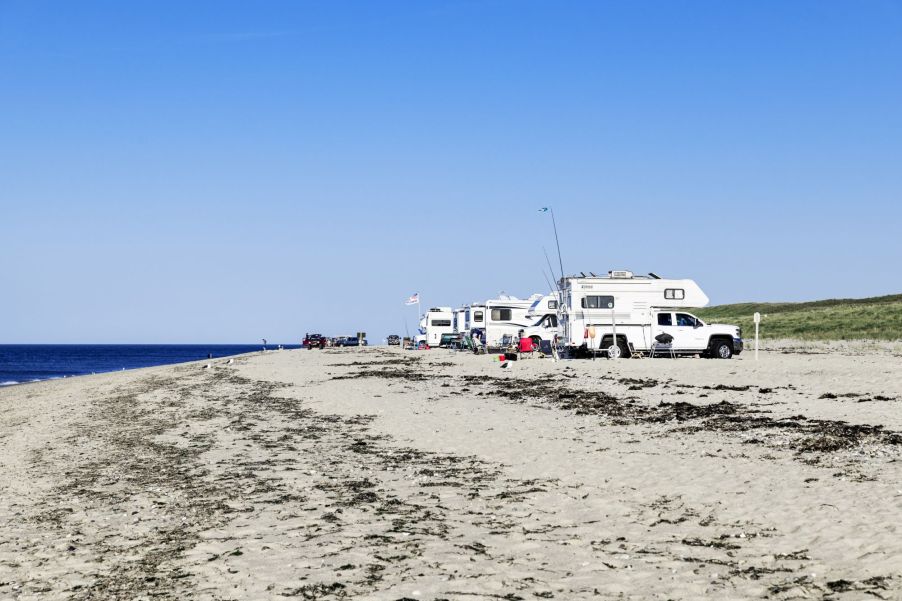
8 Essential Beach Camping Tips for Your Next RV Vacation
Can you imagine listening to the sound of waves crashing on the beach as you wake inside your RV? Or stepping out your camper door to feel the ocean breeze as it carries the faint sound of children laughing, building sandcastles, and chasing after brightly colored kites? Every year, many people dream of RV camping at the beach.
8 tips for RV camping at the beach

The thought of RV camping at the beach may seem like a logistical nightmare. What do you need to pack? Is there an RV campground at the beach, or does it require boondocking? The reality of RV camping at the beach isn’t as complicated as you might imagine, but there are some things you should know before you load or rent an RV.
1. Begin planning your RV beach camping trip now
Think about the scenario that makes you happy and most comfortable when planning your RV beach camping trip. For example, would you rather be in a KOA Campground with established RV site parking pads and electric hookups or boondocking on the sand with no campground amenities.
2. Make reservations in advance
According to KOA, “During peak season, the best beach campgrounds will fill up fast,” with some campgrounds taking reservations up to a year in advance. Boondocking spots are typically first-come-first-served. If you decide on a beach vacation over the Fourth of July in late June, you might be out of luck until next year. Off-season trips typically offer lower campground rates, less crowding, and cooler temperatures, making RV camping at the beach more accessible and enjoyable.
3. Pack the right RV beach camping gear
Jeremy and Stephanie Puglisi from GoRving tell us, “The key to enjoying a great beach camping getaway is being prepared for the elements.” Things like swimsuits, beach towels, and sunscreen typically make everyone’s list for going to the beach. But RV camping at the beach means you’ll be living with sand, sun, wind, and water for an extended period.
Don’t forget to pack some warmer clothes for sitting outside after sundown, two swimsuits per person, so one is always dry, and rash guards to protect skin from sun and surf. Families with smaller children benefit from pop-up shade tents, large beach blankets, and small kiddie pools when the surf is too rough for littles to enjoy.
4. Avoid sunburns
Sunscreen is likely already on your list. However, you should also add lightweight long-sleeved shirts and pants and a wide-brimmed hat and sunglasses. Large umbrellas and pop-up shade structures with sand anchors provide a place to cool off from the sun.
5. Plan meals and buy groceries before arriving
If you are a veteran RV camper, plan your favorite camping meals. If you’re new to RV camping, remember that the refrigerator, the oven, and countertop food preparation areas are smaller than those at home. However, cooking over a fire at the beach opens up new fun and delicious possibilities. The key here is to do your grocery shopping before arriving at the beach to avoid limited options and higher prices.
6. Don’t forget your camping gear
In the excitement of getting to the beach, don’t forget that you’ll be camping too. So remember to pack your usual camping gear like camp chairs, grills, marshmallow forks, and outdoor games. After a long day filled with surf and sand, you’ll be glad you did.
7. Keep the sand on the beach
Whether you are camping directly on the sand or at a paved RV site near it, keeping the sand where it belongs and out of the RV is a challenge. Beach towels should never enter the RV, and inside towels have no place outside. Make a “No Shoes in the RV” rule and keep a shallow tub of water near the steps outside to rinse sandy feet before coming in. If your RV or the campground has an outdoor shower, use it. If not, put a splitter on your water connector to add a separate water hose and rinse away salt and sand before coming inside.
8. Watch for changing conditions
At some point, you’ll want to use your RV’s awning to provide shade at your campsite. It’s one of the best things about having an RV. Just be aware that wind conditions change rapidly at the beach, and leaving your awing out while you’re gone could find you returning to a ruined awning. If you are camping on the sand, be aware of your surroundings when you pick a place to park. Parking on damp sand during low tide could leave you stuck when the tide comes in. Keeping an eye on the weather for incoming storms is always a good idea in an RV, whether at the beach or not.
Let’s go RV camping at the beach
Now that you’ve planned your trip, made reservations, and packed the RV, it’s time to hit the road. One bonus tip is to make your travel days short. If you live more than a few hundred miles from your destination, split the drive into multiple days. Several stores and rest areas offer overnight parking for weary RV drivers. Just try not to make it look like you’re living in their parking lot. Finally, remember to relax, enjoy the trip, and make memories with your loved ones.



